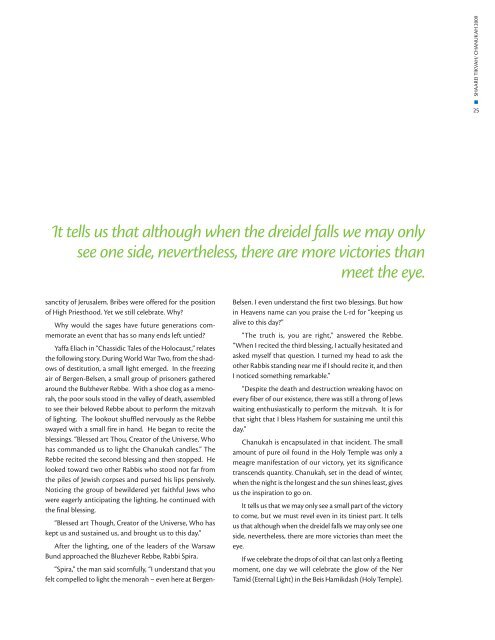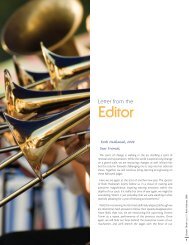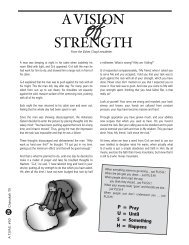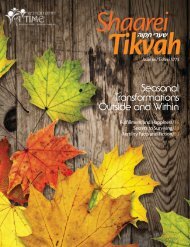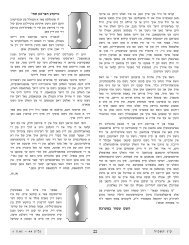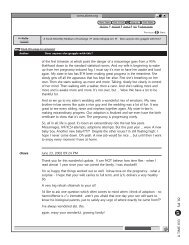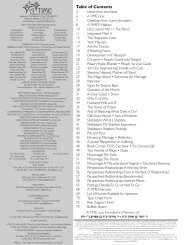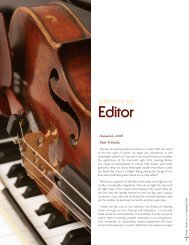Create successful ePaper yourself
Turn your PDF publications into a flip-book with our unique Google optimized e-Paper software.
SHAAREI TIKVAH/ CHANUKAH <strong>2009</strong><br />
25<br />
It tells us that although when the dreidel falls we may only<br />
see one side, nevertheless, there are more victories than<br />
meet the eye.<br />
sanctity of Jerusalem. Bribes were offered for the position<br />
of High Priesthood. Yet we still celebrate. Why?<br />
Why would the sages have future generations commemorate<br />
an event that has so many ends left untied?<br />
Yaffa Eliach in “Chassidic Tales of the Holocaust,” relates<br />
the following story. During World War Two, from the shadows<br />
of destitution, a small light emerged. In the freezing<br />
air of Bergen-Belsen, a small group of prisoners gathered<br />
around the Bulzhever Rebbe. With a shoe clog as a menorah,<br />
the poor souls stood in the valley of death, assembled<br />
to see their beloved Rebbe about to perform the mitzvah<br />
of lighting. The lookout shuffled nervously as the Rebbe<br />
swayed with a small fire in hand. He began to recite the<br />
blessings. “Blessed art Thou, Creator of the Universe, Who<br />
has commanded us to light the <strong>Chanukah</strong> candles.” The<br />
Rebbe recited the second blessing and then stopped. He<br />
looked toward two other Rabbis who stood not far from<br />
the piles of <strong>Jewish</strong> corpses and pursed his lips pensively.<br />
Noticing the group of bewildered yet faithful Jews who<br />
were eagerly anticipating the lighting, he continued with<br />
the final blessing.<br />
“Blessed art Though, Creator of the Universe, Who has<br />
kept us and sustained us, and brought us to this day.”<br />
After the lighting, one of the leaders of the Warsaw<br />
Bund approached the Bluzhever Rebbe, Rabbi Spira.<br />
“Spira,” the man said scornfully, “I understand that you<br />
felt compelled to light the menorah – even here at Bergen-<br />
Belsen. I even understand the first two blessings. But how<br />
in Heavens name can you praise the L-rd for “keeping us<br />
alive to this day?”<br />
“The truth is, you are right,” answered the Rebbe.<br />
“When I recited the third blessing, I actually hesitated and<br />
asked myself that question. I turned my head to ask the<br />
other Rabbis standing near me if I should recite it, and then<br />
I noticed something remarkable.”<br />
“Despite the death and destruction wreaking havoc on<br />
every fiber of our existence, there was still a throng of Jews<br />
waiting enthusiastically to perform the mitzvah. It is for<br />
that sight that I bless Hashem for sustaining me until this<br />
day.”<br />
<strong>Chanukah</strong> is encapsulated in that incident. The small<br />
amount of pure oil found in the Holy Temple was only a<br />
meagre manifestation of our victory, yet its significance<br />
transcends quantity. <strong>Chanukah</strong>, set in the dead of winter,<br />
when the night is the longest and the sun shines least, gives<br />
us the inspiration to go on.<br />
It tells us that we may only see a small part of the victory<br />
to come, but we must revel even in its tiniest part. It tells<br />
us that although when the dreidel falls we may only see one<br />
side, nevertheless, there are more victories than meet the<br />
eye.<br />
If we celebrate the drops of oil that can last only a fleeting<br />
moment, one day we will celebrate the glow of the Ner<br />
Tamid (Eternal Light) in the Beis Hamikdash (Holy Temple).


